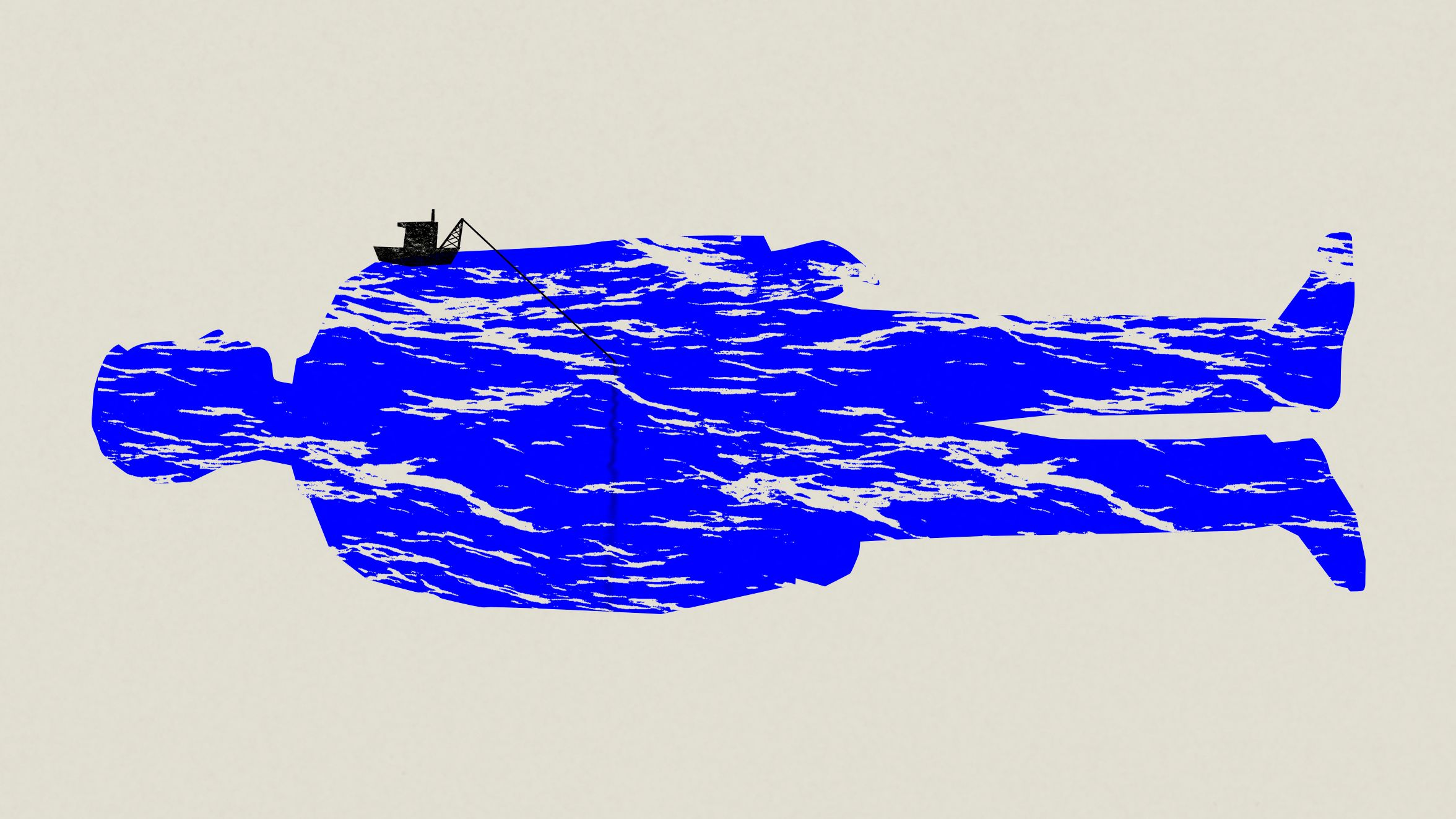Have novels left anything unsaid about the internet of the past fifteen years? It feels as though they’ve exhausted the terrain, but perhaps they’ve just made the same points over and over, their fragmented forms conjuring a user experience of broken attention, malaise, outrage, envy, and boredom. They have evoked the texture of e-mail exchanges; they have barged into the group chat; they have skewered the rhythms and argot of apps such as Hinge and Slack. If we ever needed fiction to make online phenomena coherent, we don’t now. The internet is already a part of us, inside of us; and maybe what remains for the digital novelist is to get outside, to gather up the whole snarled mess of tubes and plunk it down on an examination table.
“Twist,” by the Irish author Colum McCann, projects an impatience with the idea that our individual and subjective experiences of the internet have much more meaning to yield. Instead, the book takes as its subject the underwater fibre-optic cables that relay computer data around the world. In McCann’s hands, the web is a tenuous thing, dependent on cords about the diameter of a garden hose. These strands, which conduct information as pulses of light, have long been vulnerable to accidental damage by fishing trawlers and curious marine predators; more recently, there are fears that they’ve been targeted by saboteurs in the Baltic and the Taiwan Strait. In “Twist,” a cable off the Ghanaian coast has been severed, setting in motion a repair mission.
Discover notable new fiction, nonfiction, and poetry.
The cable’s fragility provides the novel with both a premise and a central metaphor. Our narrator, Fennell, an Irish journalist, playwright, and author in his late forties, has taken an assignment to embed with the crew of men who are tasked with fixing the broken filament. Fennell, who tirelessly scrapes the world for literary meaning, is looking for “a story about connection, about grace, about repair.” Through his narration, “Twist” presses the cables into asserting the value, violence, and frailty of human communication.
McCann is best known for sweeping social novels held together by an organizing figure. Most famously, there’s “Let the Great World Spin,” from 2009, which won a National Book Award. Bounding the action are two historical events: the acrobat Philippe Petit’s walk across a tightrope strung between the Twin Towers, in 1974, and the fall of the towers on September 11, 2001. These incidents—one an expression of striving in the sky, the other a horrific crashing-to-earth—form the two poles of the novel, which comes down on the side of uplift. “The core reason for it all was beauty,” Petit thinks as his limbs guide him out onto the wire. “Everything was rewritten when he was up in the air.”
“Let the Great World Spin” reveals certain drawbacks and benefits to working with overarching symbols in fiction. The tightrope metaphor can feel goofy and schematic, but there’s also the excitement of tracking the unfurling of a grand statement, and the frisson of wondering whether McCann’s gambit (like Petit’s) will succeed. McCann can be maudlin and stentorian; he gives the impression of always looking for the epigrammatic utterance that makes you gasp. (“You can count the dead, but you can’t count the cost,” one character writes. Another intones “there is, I think, a fear of love. There is a fear of love.”) But “Let The Great World Spin” was written in the aftermath of 9/11, when the absence of the towers was palpable, and this haunting lends a kind of weight to the book’s passages about the persistence of the human spirit. At his best, McCann does an assiduous, subtle job of twining his metaphors through everyday life. Chapters are set loosely in and around New York City and unfold from the perspectives of various typecast denizens of the concrete jungle: a sex worker in the Bronx, a housewife in a Park Avenue penthouse. As McCann steers his characters into proximity with each other, the connections they create feel as tenuous and daring as Petit’s walk between the towers.
“Twist” attests to the fact that it’s easier to build a novel upon high-wire feats of death-defying athleticism than it is to fashion one around fibre-optic cables at the bottom of the ocean. A tightrope implies a person; it’s like an instrument awaiting a musician. In “Let the Great World Spin,” the cable almost became part of Petit’s body, a trembling extension of his vulnerability and flexile grace. But the tubes in “Twist” are inert and remote. They’re muffled in Kevlar and rest on the seafloor, as befits the physical underpinnings of something gigantic and nearly impossible to comprehend.
McCann compounds this difficulty by only sparingly engaging with digital life. A character has a brush with online message boards and the vile extremism they foster. Fennell, the reporter, composes text messages to an estranged son which he both longs and dreads to send. But the internet, for the most part, is approached as an abstraction, which intensifies the pressure on the passages that convey offline reality. These scenes—of characters exploring Cape Town or navigating London or wandering around different parts of the boat—should be a dossier of vivid sensations and interpersonal drama. Instead, they are thinky, muted, and limp.
McCann often constructs his novels around a sensitive action-hero type, a man whose drive is tempered by a tender spirituality. In “Let the Great World Spin,” this specimen was Petit; in “Twist,” the role has been filled by Conway, the leader of the repair mission. Conway, an Irishman like Fennell, rides a motorbike, inspires worshipful devotion in his crew, and can free-dive to extraordinary depths. He is physically fit and “handsome in a way that seemed to puzzle him,” which made me wonder whether, like Aquaman, Conway is not supposed to be very bright. But it’s more that he has fallen out of step with the world, with its smallness and meanness. He is grieving the end of his relationship with a South African actress named Zanele; he is also mourning the climate crisis, which seems to loom in his and in Fennell’s minds as a symbol of humanity’s fall from grace.
But Conway’s characterization is too thin to hold our interest. We see him mostly through the eyes of Fennell, who has a journalist’s weakness for cliché: “Something about Conway . . . seemed buried away elsewhere,” Fennell thinks. “Some loneliness lodged in him.” Later, referring to Leonard Cohen’s song “Hallelujah,” he speculates that “Conway had that secret chord”; he was “the sort of man who was there and not there at the same time.” “Let the Great World Spin” played productively with the dynamic of two brothers, one a kind of holy fool and the other a wised-up bystander. In “Twist,” both main characters feel like avatars of their author and of each other: romantics who have been disappointed by contemporary society and who are looking for something that will restore their faith.
The novel moves more briskly when the ship’s crew is introduced. McCann’s gift for ensemble writing hasn’t rusted. He has an ear for touchy social interactions, especially among men whose feelings are more delicate than they’d like to admit. A few sharp phrases zap Conway’s deputies to life: one of them, Ron, is “a tight, compact man from Virginia, the only American onboard . . . elaborately, if predictably, tattooed.” But for the most part, instead of characterization, we get theme-y philosophizing that seems to come from everywhere and nowhere. (“We are creatures of great change. Not a single atom in our bodies today was there when we were children. Every bit of us has been replaced many times over. We flake away and become new.”) Zanele, one of the story’s few women, is particularly ill-served by this tendency. McCann describes her less as a person than as another one of his slender cords, “moving upward through the water, in profile, in a wetsuit and a single long black fin.” When she departs the action, Fennell reflects, “It was almost as if in her absence she was more acutely there.”
And don’t get him started on the cables. “It still astounded me that nearly all our information travels through tiny tubes at the bottom of the ocean,” Fennell marvels early on. Versions of this sentiment—“the idea that there was a cable lying so far beneath the ocean still seemed otherworldly,” “it was fascinating to think that an email or a photograph or a film could travel at near the speed of light in the watery darkness”—are repeated until you want to rip all of the electrical wiring out of your walls. In “Let the Great World Spin,” a young man ships off to Vietnam to work on a computer program that tallies fatalities. When he is killed, his mother thinks about how his project converted flesh into a stream of code and fantasizes about finding him anew in the power grid: “It was as if she could travel through the electricity to see him. She could look at any electronic thing—television, radio, Solomon’s shaver—and could find herself there, journeying along the raw voltage.” But “Twist” doesn’t establish the human stakes of the internet cables getting repaired—there’s no mother anxiously awaiting word of her son by e-mail. There are only two taciturn Irishmen gazing out at the sea.
In places, McCann sounds a bit like Hemingway—attentive to process, technical, but also dreamy, almost somnambulant:
At such moments, when McCann looks around at the world he’s created, the book achieves a quiet power. But other parts of the novel don’t share this reverence for the thing—the “actual cable”—rather than the metaphor. In a later scene, as Fennell observes the ship’s crew going about their business, he falls into a reverie about different vessels, throughout history,
It’s not clear what these bits of shorthand are trying to evoke, other than a kind of off-the-rack profundity. Readers are likely aware of the transatlantic slave trade, the laying of telegraph lines in the nineteenth century, and the waging of wars by sea; name-checking these undertakings here does not meaningfully open up the book’s aperture. As in “Let the Great World Spin,” McCann seems to want to summon the overwhelming bigness of his subject matter, but he has abandoned the technique that previously helped him do so, the creation of convincing human beings to measure his ideas against. There is, perhaps, in Conway’s larger-than-life qualities, an attempt to scale up the personal rather than right-size the symbolic.
With its references to climate disaster and poverty in the global South, “Twist” feels animated by a desire to survey an elemental injury. In particular, McCann appears eager to wrap his arms around the internet’s social, political, and spiritual impact: how instant global connectivity has brought people together but also fostered hate and devastated nature in the name of progress. As the novel’s characters investigate the damage that was done to the cables, the novel itself tries to account for the damage that the cables have done to us.
The problem with this approach is that, in a narrative and perhaps ontological sense, cables don’t do anything. Nor does the internet do anything, as such. People do things. And, by dwelling too fervently on the tubes at the expense of his characters, McCann reprises the offense of the tech lords who have structured reality as if it didn’t have any human beings in it. ♦


